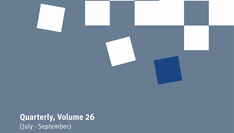Abstract
The paper is dedicated to two main issues, namely (1) the representation of general Islamic ethics, the analysis of its specific methodology of moral validation by referring to the Qur'an and Sunna, and its interconnectivity with the Islamic law – Shari’a, as well as to (2) presenting Islamic managerial ethics as a derivative from the general Islamic ethics when it comes to both building moral arguments and propagating the proper moral behavior by promoting moral virtues and normatively analyzing what is right and wrong in the particular business situation.
Among the used methods, there was content analysis, comparable analysis, inference, and the evolution of the normative theories. Then, the very Islam-specific confluence of ethics and law is discussed. These data are presented and analyzed as a required context for proper understanding of applied ethics in Islam, and in the case of this paper – Islamic managerial ethics.
References
A’la Mawdudi, S. A. (2003). Understanding the Qur’an: An Introduction [In:] The Meaning of the Holy Qur’an. The Islamic Foundation, p. 15–36.
Abbas, R. Z., Gondal, I. A., Junad, M. R., Rana, G. A., Aslam, T. M. (2012). Managerial Ethics in Islamic Framework. “International Journal of Business and Social Science”, 3(7).
Abdul-Raouf, H. (2001). The Qur’an Outlined: Outline, Theme and Text. Ta-Ha Publishers.
Abdul-Raouf, H. (2003). Exploring the Qur’an. Al-Maktoum Institute Academic Press.
Badawi, J. (2016, August 6). Characteristics of the Islamic Moral Code. About Islam. Access on the internet: https://aboutislam.net/reading-islam/characteristics-islamic-moral-code/
Coulson, N. J. (2001). A History of Islamic Law. Edinburgh University Press.
Donaldson, D. M. (1953). Studies in Muslim Ethics. SPCK.
Fakhry, M. (1994). Ethical Theories in Islam. Brill.
Goodman, L. E. (1999). Avicenna [In:] Audi, R., ed., The Cambridge Dictionary of Philosophy. Cambridge University Press.
Goring, R. (1995). Dictionary of Beliefs and Religions. Wordsworth.
Hourani, G. H. (1979). Ghazali on the Ethics of Action. “Journal of American Oriental Society”, 96(1).
Hourani, G. H. (1985). Reason and Tradition in Islamic Ethics. Cambridge University Press.
Inati, S. (1996). Ibn Sīnā [In:] Nasr, S. H., Leaman, O., eds., History of Islamic Philosophy. Routledge, p. 231–246.
Kamali, M. H. (2003). Principles of Islamic Jurisprudence. The Islamic Texts Society.
Nanji, A. (2005). Islamic Ethics [In:] Singer, P., ed., A Companion to Ethics. Blackwell, p. 106–120.
Ogunbado, A. F., Umar, A. (2019). Islamic Ethics of Management: Principles, Standards and Practices. Research Gate. Access on the internet: https://www.researchgate.net/publication/331087441_Islamic_Ethics_of_Management_Principles_Standards_and_Practices/citations#fullTextFileContent
Philips, A. A. B. (2003). The Evolution of Fiqh (Islamic Law and The Madh-habs). Islamic Book Service.
Quran (2021). Quran.com. https://quran.com/61
Reinhart, A. K. (2001). Ethics and the Qur’an [In:] McAuliffe J.D., ed., Encyclopedia of the Qur’an, Vol. 2. Brill.
Salleh, M. F. M. (2019). The Role of Islamic Management in Building Ethics in Organizations. “Advances in Economics, Business and Management Research” 74. DOI: 10.2991/aicmar-18.2019.32
Shayegan, Y. (1996). The Transmission of Greek Philosophy to the Islamic World [In:] Nasr, S. H., Leaman, O., eds., History of Islamic Philosophy. Routledge, p. 89–104.
All texts published in the journal Modern Management Review are available in the full version on the website of MMR. Digital IDs have also been entered from number 19 (3/2012) (DOI: 10.7862/rz.2018.mmr.1)
Open Access – CC BY 4.0
This is an open access journal which means that all content is freely available without charge to the user or his/her institution. The articles are published under the terms of the Creative Commons licence (CC-BY 4.0), including the following fields of exploitation comprising:
1) the right to publish the Work in print in book and digital form and to distribute it in book and digital form, including by displaying, playing, broadcasting, making it publicly available by the Publisher and third parties,
2) the right to record and reproduce all or part of the Work on paper and in the form of a digital record and in any other possible way by the Publisher,
3) the right to enter the Work into computer memory and save the Work in the IT systems of the Publisher and other entities distributing digital content,
4) the right to archive the Work and make copies of the Work on electronic media by the Publisher, without quantitative restrictions,
5) the right to digitise the Work and to perform conversions/transformations of the Work in electronic form into other digital formats by the Publisher and third parties,
6) the right to distribute the Work, including via the Internet or other ICT networks by the Publisher and other third parties, in a way that allows viewing, reading, copying the content of the Work in electronic form, i.e. all elements belonging to it, whereby copying shall be understood as the saving of the Work made available to an interested person on a medium of their choice,
7) the right to store the Work in the database of the Publisher and other entities distributing the Work in any form, as well as its processing in the database of the Publisher and third parties,
8) right to translate and publish the Work in one of the modern languages in any form by the Publisher and third parties.


